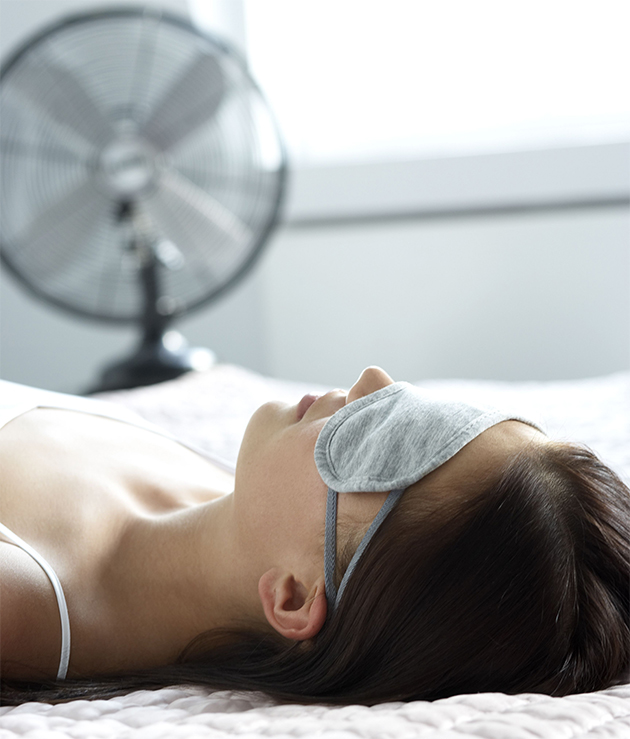How does warmer weather affect your sleep?
The Washington Post recently covered our latest survey on summer stress, including our finding that warmer weather can affect sleep with “80% saying they sleep better in cool weather.”
It turns out, this statistic has more to do with science than personal preference. As a Stanford Biology professor told WebMD, “When you go to sleep, your set point for body temperature—the temperature your brain is trying to achieve—goes down. Think of it as an internal thermostat.” But just as that drop in required temperature induces sleep, if you’re slumbering in too warm of an environment, you’ll wake up.
In fact, thermoregulation (or how your body distributes heat) is a key component of a good night’s sleep. Very often, and without even knowing it, insomniacs struggle with warmer core body temperatures, which can be offset by a cooler room temperature. While everyone’s needs are different, SleepRate recommends experimenting with room temperatures somewhere between 60 to 68 degrees.
What Is Thermoregulation?
Thermoregulation may sound like a really science-y word that makes your eyes glaze over. But the concept it stands for is actually pretty straightforward. At its simplest, thermoregulation is the process by which our bodies maintain their core internal temperature (otherwise known as homeostasis). The body does this by closely balancing heat gain and heat loss.
During the day, our body temperature naturally undergoes minor fluctuations while still maintaining a relative state of equilibrium. These temperature fluctuations are often related to alertness. For example, most people feel most alert in the morning, when their body temperature is at the higher end of the normal range, and then experience an afternoon energy slump when their body temperature naturally starts to drop slightly, setting the stage for sleep later in the evening.
How Do Hot Temperatures Affect Sleep?
Exposure to hot temperatures while you’re trying to sleep can make it harder to fall and stay asleep and reduces sleep quality overall. Research suggests heat exposure can affectsleep in several ways. These include the following:
- Increases in the number of night-time wakeups (aka sleep disturbances)
- Decreases in the duration of REM sleep. As noted above, our bodies’ abilities to regulate temperature decline during REM sleep. Thus, if we’re feeling excessively hot while sleeping, our bodies may be less likely to drift into REM sleep because they can sense that these temperature-regulating mechanisms are needed.
- Decreases in the duration of slow wave sleep (SWS), which is a sleep stage in which the brain’s electrical wave activity slows down to give the brain a rest
- Disruption of a person’s circadian rhythms, which may escalate sleep disturbances moving forward
- Potential increases in breathing difficulties among people with sleep apnea
So far, research suggests these effects are more likely to occur early on in someone’s sleep versus later in the night. This may be because the wakeups in the early stages make the person feel sleepier, which can override the heat-induced disturbances later in the night.
The same research also suggests that pairing high temperatures with high levels of humidity can exacerbate the sleep disturbances described above. As with regular ‘ol heat, humidity is most likely to disrupt a person’s sleep in the earlier segment of the night.
The effects of hot temperatures on sleep are so significant that research suggests the rising temperatures brought on by climate change are likely to have global ramifications for sleep quality. Research suggests that if the U.S. experiences a rise in average temperatures of only 1 degree Celsius, this will result in an extra nine million nights of insufficient sleep every single month.
This could have significant consequences for public health, given that sleep deprivation is associated with a wide range of health issues including diabetes, heart disease, anxiety, depression, and even a greater mortality risk. Elderly and low-income communities are especially vulnerable to hot temperatures, because they may lack the physiological or financial resources necessary to counteract rising temps.
How Do Cold Temperatures Affect Sleep?
Just as hot temperatures can have a negative impact on a person’s sleep quality, so can excessively cold temperatures make it harder to fall and stay asleep and inhibit sleep quality overall. The same research cited above found that cold may influence sleep in thefollowing ways:
- Decreases in the duration of REM sleep. As noted above, this may be because our bodies can sense that temperature-regulating mechanisms are necessary. Because these mechanisms aren’t active during REM sleep, this may help explain why our bodies are less likely to slip into REM sleep when we’re feeling excessively cold
- Decreases in the duration of SWS sleep
- Increases in sleep disturbances, which are more likely to occur in the latter segments of sleep
- Potential increases in symptom severity among people with insomnia
That being said, the appropriate use of blankets and clothing may mitigate or even eliminate these issues. It should also be noted that cool bedroom temperatures may be ideal for sleep (more on that below). What we’re talking about in this section is the negative effects of excessively cold temperatures.
What Is the Ideal Bedroom Temperature?
Many experts agree that the bedroom temperature that is most ideal for high-quality sleep is anywhere between 60°F and 65°F, while others advocate for a bedroom temperature that rests somewhere in between 65°F and 72°F.
Why the relatively low temp recommendations? This is largely because (as noted above), your body temperature needs to drop a bit before your body is able to successfully drift off to sleep. Cooler bedroom temperatures facilitate this body temperature drop and prevent you from overheating (and waking up) once you’ve fallen asleep.
That being said, comfort ultimately trumps specific temperature recommendations. If 60°F (or even 65°F) feels uncomfortably cold to you and you’re shivering under your comforter, then you’re not going to enjoy the quality sleep you crave.
For this reason, the ideal bedroom temperature may vary from person to person. Don’t be afraid to experiment with different thermostat settings until you’ve found the temperature range that best encourages restful sleep.
Better Sleep Strategies for Hot Sleepers
If you find yourself regularly overheating while sleeping, it’s important to take steps to address this issue. Here are some of the best strategies for cooling down a hot bedroom in order to enjoy better sleep:
- Strip down. This can apply to both your body and your bedding. Feel free to sleep naked (or close to it), and strip your mattress of any excess bedding that might be trapping heat.
- Invest in pajamas and/or bedding that utilizes heat-wicking fabrics. At the very least, opt for cotton over silk or polyester; cotton does a better job of allowing for air circulation.
- Purchase a pillow that contains heat-dissipating features. Be wary of all-foam pillows, which may conform too closely to your neck and head to allow air flow, thereby trapping heat. Check out our Best Pillows reviews for some stellar options.
- Encourage air flow by leaving open the bedroom door or window. Or consider investing in a fan or air conditioning unit for both a cooling effect and additional air flow.
- Take a hot shower before hitting the sheets. This probably sounds counterintuitive, but here’s why it works: When you step out of a hot shower, your skin will come in contact with the cooler air, which prompts a drop in body temperature. As previously noted, this drop in core body temperature is essential for drifting off to sleep.
- Keep your bedroom curtains closed during the day. This helps keep out the sunshine, which can reduce the likelihood of your bedroom heating up during the day.
- Mind what you eat and drink. Stay hydrated throughout the day and consider drinking some cold water prior to bed. (Just don’t guzzle too much, because this might increase the chances that you’ll wake up in the night needing to go to the bathroom.) Avoid drinking caffeine or alcohol or eating a large meal before bed, as all of these activities can lead to a spike in body temperature.
- Avoid exercising right before bed. Exercise can result in a temporary spike in body temperature, which can be further exacerbated by a hot room. Ideally, squeeze in your exercise well before the hours leading up to bed.
- Stow your pillowcase in the fridge or freezer in the hour or two leading up to bed, so you can lay down on a cooling surface when you first hit the sheets.
- Invest in a dehumidifier. As noted above, if your bedroom is both hot and humid, this is likely to exacerbate sleep disturbances. Knock out one of these issues by investing in a dehumidifier, which can help reduce the odds that humidity will compound heat’s sleep-zapping effects.
- Up your mattress game. If you’re in the market for a new mattress, consider purchasing one that features cooling technology. If you sleep with a partner, make sure your mattress is large enough to give you both adequate personal space so you aren’t exchanging too much body heat. If you’ve ever tried to sleep right next to a partner on a hot summer night, then you don’t need us to tell you that human bodies can radiate heat while sleeping!
Better Sleep Strategies for Cold Sleepers
Just as sleeping hot can seriously impair sleep, the same goes for sleeping cold. In fact, one study found that raising cold sleepers’ skin temperature by less than 0.5 degrees Centigrade significantly improved participants’ sleep quality by reducing nighttime wakeups and increasing the duration of deep sleep.
If you can’t sleep because your teeth are chattering every night, here are a few strategies that can help warm you up enough to enjoy a sound night’s rest:
- Turn up the heat. This may seem like a no-brainer, but it comes with a caveat: Avoid over-correcting and setting the thermostat for higher than 72°F, as this might make the bedroom too hot—prompting middle-of-the-night wakeups. If you don’t have control over the exact temperature of your bedroom, consider investing in a space heater to introduce some additional heat into the room.
- Pile on the layers. This is true both for your personal pajama set and your bedding. Consider wearing long-sleeved, long-pants pajamas made from warm (yet breathable fabrics), and layer on as many blankets or comforters as you need to feel comfortable. You can always take off layers if you start to feel too hot.
- Keep your feet warm. Cold feet are a common sleep-disrupting culprit among folks who tend to sleep cold. Consider sleeping with socks on or adding an extra layer of blankets over your feet in order to keep them moasty toasty.
Final Words on Thermoregulation During Sleep
Thermoregulation is a natural and critical process that occurs throughout the course of every day. The body’s natural temperature regulation processes can be impacted by a number of factors ranging from illness or digestion to external temperatures.
It’s important to take steps toward ensuring that your bedroom remains at an optimal temperature for sleep. If you tend to run hot or cold at night, the preceding strategies should facilitate your body’s natural thermoregulatory processes. (Of course, it’s always a good idea to consult a physician if you have specific concerns about your sleep quality.) By supporting your body in sustaining an appropriate temperature, you’ll increase your odds of enjoying uninterrupted, high-quality sleep.





